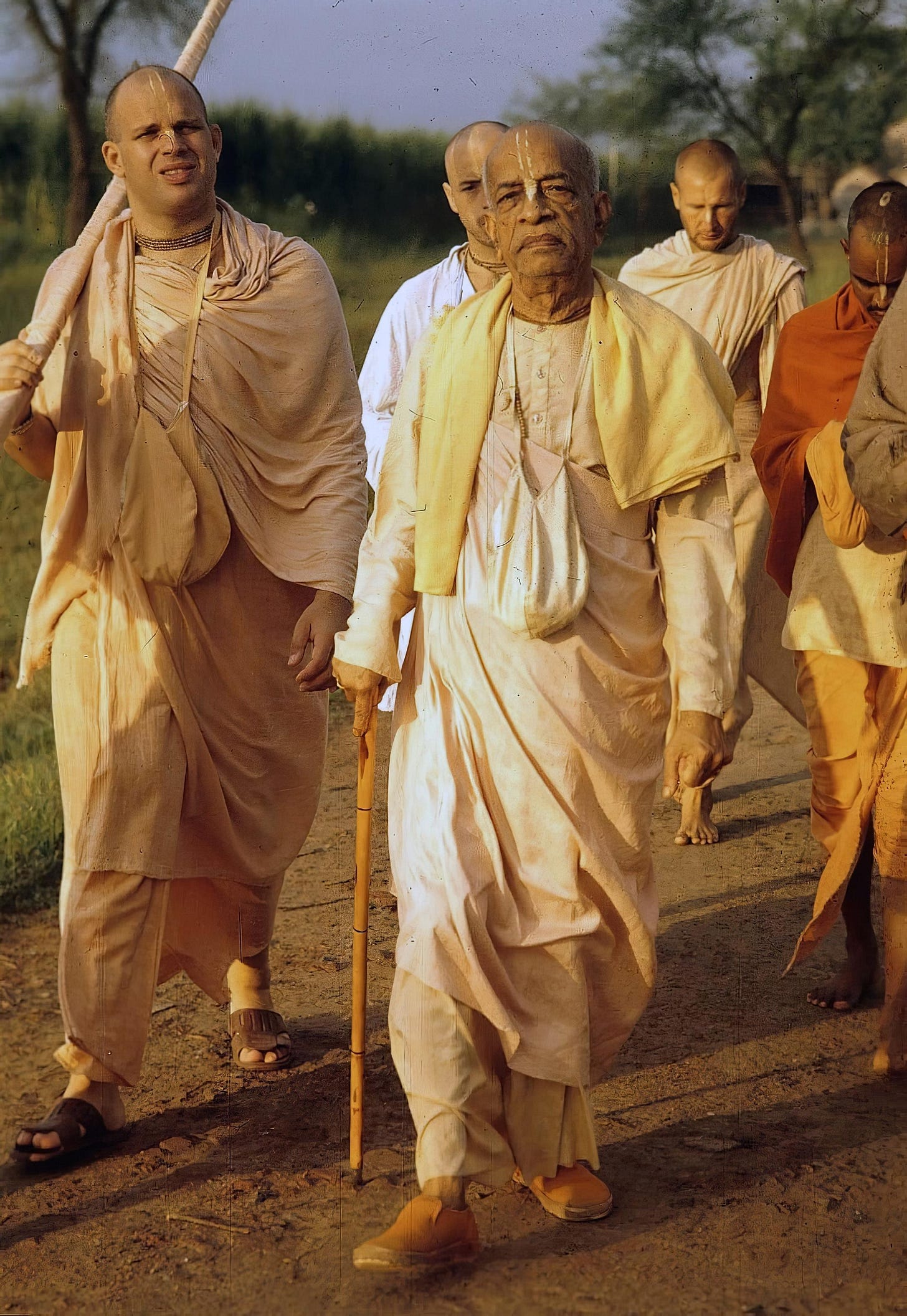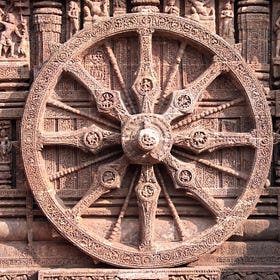Prabhupada's pentapod
Prabhupada organized his movement as a combination of temples, communities of devotees schools, and gośālās. To these four, he added book distribution. Combined, they make a magic recipe.
Almost everyone likes sweet rice. Even devotees who follow a vegan diet try to find alternative recipes using non-dairy milk substitutes. There are many variations of the recipe, but the basic ingredients for sweet rice are four: rice, milk, sugar, and cardamom. By combining these four ingredients, cooking for a sufficient time, and allowing it to cool, one can't go wrong.
Similarly, Srila Prabhupada organized his movement as a combination of temples, communities of devotees (he established farm communities and envisioned communities of devotees centered around the temples in the cities), schools, and gośālās. To these four basic components, he added book distribution as a way to reach the public.
Just like in sweet rice, when we can properly combine all of these ingredients, the result is wonderful. The problem is that we often discard the parts we consider difficult to establish, and thus the result is not so nice. I'm guilty of that myself, and therefore I'm writing based on my own experience.
For example, schools for devotee children are very difficult to maintain, but they are very important. Unfortunately, there were many cases of abuse in the past that created a very toxic environment, which not many are willing to navigate. Being schools so difficult to get right, we tend to leave it aside, preferring to put our attention to other projects. The parents then have the choice of trying homeschooling their children (in countries where the local laws allow it), moving to one of the few yatras that offer successful schools, or sending the children to regular schools. The lack of good Vaishnava schools makes our communities a lot weaker and undermines the education of the next generations.
Gośālās are also very difficult to maintain. In Vedic times, vaiśyas used to become extremely rich by taking care of cows and selling milk products, but in our times, it seems that no one has, up to now, found the formula on how to create a prosperous business model based on cow protection. However, cows are a very essential part of Vedic culture. It's not really possible to have a Vedic society (or any type of really prosperous, sustainable society without cows). Cows not only give milk, but they also help people advance to the mode of goodness, which is essential for spiritual life. We want to become Krsna Conscious while working in offices and factories, but we can see that it is very difficult. Without a peaceful lifestyle centered around the land and cows, it is very difficult to even understand what Krsna Consciousness is, and what to say about really practicing it.
We also struggle to build successful communities, which are another essential aspect of our movement. Successful rural communities are very rare, and even prosperous communities of devotees in cities, molded around temples, are not so common. Since it's difficult to live together, we often also skip this part, preferring to try to follow Krsna Consciousness on our own. The problem is that without communities, we have a hard time remaining strong in spiritual life, and without the protective environment of a devotee community, our children more often than not opt not to follow the devotional path.
We have many temples, but without the other three components, our temples can't operate at their full potential. Temples that are not backed by strong communities tend to be very weak and often end up working more like halls for the Sunday festivals. Communities, on the other hand, depend on the existence of schools, gośālās, land, and so on. As we can see, these four aspects are interconnected.
Finally, there is book distribution, which is supposed to be the main engine for the propagation of our movement. The problem is that when people become interested in our books, they want to see an environment where the philosophy described in the books is being practiced, and, of course, we lack such an environment in most of our yātrās. We just live and work in the cities, eating processed food and sending our kids to public school like everyone else. We have a high philosophy, but we are often not very good representatives of it. As a result, our book distribution is also not very effective, since we don't have the necessary structure to back it up. As a result, even when people become interested in Krsna Consciousness, they are often not very enthusiastic about joining us. Truth can be shocking, but often we don't really represent the movement Prabhupada speaks about in his books.
Back to the original example, it is just like if we try to make sweet rice without milk, without sugar, and without cardamom. In the end, we will just have plain white rice, which is not so attractive. The fault is not in the recipe, but in the fact that we don't want to spend the necessary effort to secure all the necessary ingredients and prepare it in the proper way.
As you can imagine, this is a very difficult problem to solve. It's quite improbable that a single person may have all the necessary talents to simultaneously tackle all these four components, together with book distribution and other forms of outreach. From this, we can understand that the only way to successfully put this recipe into practice is by combining forces and working together in the direction of a higher goal. I believe getting this recipe right is the great challenge of our generation. When we can do it right, Krsna Consciousness will finally have the conditions to become widespread.
Read also:
Creating a perfect society: Communism, varṇāśrama, and spirituality
The Industrial Revolution brought great suffering to most of the population. While the industrialists had the opportunity of amassing fabulous wealth, the workers were forced to work in very miserable conditions, receiving very small salaries.
If you read this article to the end, give it a like. This makes Substack recommend it to more people.




Hare Krishna Prabhu ji 🙏 very true Prabhu . Highly appreciated your this article , devotees who are living in cities don't want to see the benefits of land and cows, they want to live alone and practicing Krishna consciousness. No one wants to come together because everyone thinks now time has changed these things will never be possible . Thank you prabhu for addressing this .
Harsh but true...
But what is the obstacle in developing this society prabhu ji...money?